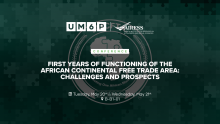VIDEO: The AfronomicsLaw Academic Forum (West Africa) Lab Series No. 3 - Trade Policy Is Not Just for Policymakers with Mishael Wambua
Fireside Chat on Trade Policy and Regional Integration: Trade Policy Is Not Just for Policymakers
The session was a fireside chat titled "Trade Policy Is Not Just for Policymakers", facilitated by Mishael Wambua, Component Lead at GIZ Support Programme for Africa Continental Free Trade Area (AfCFTA). He discussed the importance of fostering an awareness of trade policy and regional integration in Africa.
